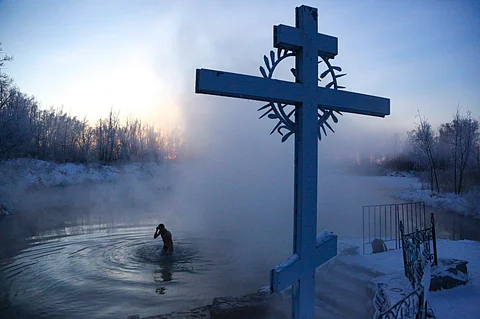

Christians around the world will mark the Epiphany on Jan. 6 with a series of celebrations that go from parades and gift-giving for children to the blessing of water. The holiday is also called the Feast of Epiphany, Three Kings Day and Theophany.
Why is it known with different names?
Some Western Christian churches know the feast day as Three Kings Day. It recalls the visit of three Magi, or wise men, to the infant Jesus, and their sense of wonder at the encounter. It is the 12th day after Christmas and closes the Christmas season.
Eastern traditions call it Theophany, and they focus on the baptism of Jesus by John the Baptist. Orthodox Christians also know it as the Baptism of Christ.
What does Epiphany mean?
The Greek word “epiphaneia” means “appearance” or “manifestation,” and it refers to the manifestation of Jesus to the world, according to Encyclopedia Britannica.
How is it celebrated?
The day is often celebrated by Catholics in Spain with parades that include decorative floats carrying people dressed as the biblical kings who brought gifts to the infant Jesus. Children in Spain and in some parts of Latin America traditionally unwrap holiday gifts that elsewhere in the world are delivered by Santa Claus on Christmas Day.
Greeks celebrate Epiphany with blessing of the waters ceremonies across the country, which is primarily Orthodox.
In Bulgaria, some observers plunge into rivers and lakes to retrieve crucifixes, in an old ritual marking the feast of Epiphany, also known as the Apparition of Christ.
By tradition, a crucifix is cast into the waters of a lake or river. It's believed that the person who retrieves it will be freed from evil spirits and will be healthy through the year. After the cross is fished out, the priest sprinkles believers with water using a bunch of basil.
When is it celebrated?
Orthodox Christian churches in Bulgaria, Greece and Romania celebrate the feast on Jan. 6. But for Orthodox Churches in Russia, Serbia and Ukraine that follow the Julian calendar, Epiphany is celebrated on Jan. 19, as their Christmas Eve falls on Jan. 6.
What is the origin of Epiphany?
It originated in the Eastern church and originally included a celebration of the birth of Jesus, according to Encyclopedia Britannica, which in its entry says that by the fourth century, the church in Rome began celebrating Epiphany separately on Jan 6. (AP)